
As Israeli Prime Minister Benjamin Netanyahu visits the White House on Monday to discuss a possible new ceasefire in Gaza, we speak with Dr. Feroze Sidhwa about the humanitarian disaster in the Palestinian territory, where Israel has damaged or destroyed much of the health infrastructure since the start of the war in October 2023. Sidhwa is a trauma surgeon in California who volunteered at Nasser Hospital in Gaza. He says Israel’s impunity in attacking hospitals across Gaza is “outrageous behavior” that blatantly violates the rules of war. “Literally every attack on a healthcare facility in Gaza has been justified by … a willful misunderstanding of international law or just outright lies.”
Transcript
AMY GOODMAN: This is Democracy Now!, democracynow.org. I’m Amy Goodman.
Israeli Prime Minister Benjamin Netanyahu has arrived in Washington, D.C., for talks with President Trump. It’s Netanyahu’s third trip to Washington since Trump’s inauguration in January. Once again, the U.S. not enforce an International Criminal Court warrant seeking Netanyahu’s arrest for war crimes and crimes against humanity committed in Gaza.
Ahead of the meeting, Trump predicted there’s a good chance Israel and Hamas will reach a deal on a new U.S.-promoted Gaza ceasefire framework, which Trump has called his “final proposal” for the Palestinians. Israeli attacks on the Gaza Strip have killed at least 24 people so far today, following another bloody weekend that saw scores of Palestinians slaughtered — among the dead, at least six people killed when Israel bombed a medical clinic in Gaza City housing displaced Palestinians; at least 15 others were wounded.
Separately, Doctors Without Borders, Médecins Sans Frontières, known as MSF, is condemning the killing of Abdullah Hammad, a former MSF worker shot dead by Israeli forces July 3rd. Colleagues say Hammad was part of a group of Palestinians seeking to collect flour from an aid truck in Khan Younis when Israeli forces attacked without warning, killing at least 16 people. Dr. [sic] Hammad is the 12th member of Doctors Without Borders killed by Israel’s military since October 2023.
Attacks on health facilities and medical workers in Gaza have been a repeated and defining aspect of Israel’s assault on Gaza. The World Health Organization reports 94% of hospitals in Gaza have been damaged or destroyed over the past 20 months, despite the fact hospitals are supposed to have protections under international law. In May, the Safeguarding Health in Conflict Coalition reported attacks on healthcare facilities worldwide have become more frequent over the last decade, and in 2024 a quarter of all the attacks on health facilities worldwide occurred in Gaza. Israel almost always justifies attacks on hospitals by accusing Hamas of militarizing these facilities. An incredible 609 healthcare workers in Gaza have been killed.
Our next guest has witnessed the consequences of these attacks firsthand. Dr. Feroze Sidhwa is a trauma, general and critical care surgeon who volunteered in March at Nasser Medical Complex in Khan Younis, Gaza, with Med Global. Last year, he volunteered at the European Hospital during Israel’s assault on Gaza. His new piece for the Council on Foreign Relations’ Think Global Health is co-authored with attorney Leonard Rubenstein. It’s headlined, “Hospital Attacks in Gaza and Israel: What Counts as a War Crime?”
Well, Dr. Feroze Sidhwa, what counts as a war crime? Explain what has happened after, what — in the latest news, we hear about this healthcare worker, this doctor [sic], who has just been killed on line for food, and the director of the Indonesian Hospital, the leading cardiologist just killed, as well, in Gaza.
DR. FEROZE SIDHWA: Yeah, Dr. Sultan. Actually, at this point, if I’m correct — I hope I’m right about this, but I’m pretty sure at this point that the director of every hospital north of the Netzarim Corridor, so in the northern half of Gaza, has either been killed or is in Israeli detention. The reason Len and I wrote this article is because we hadn’t really seen anything that brought together the fact that the attacks on healthcare in Gaza are really a defining feature of the U.S.-Israeli attack on the territory. And it’s so widespread as to be really kind of unique in history.
AMY GOODMAN: So, talk about the story of your 16-year-old patient, Ibrahim, the story you tell in your piece for the Council on Foreign Relations.
DR. FEROZE SIDHWA: Sure, yeah. On March 18th, that’s when the widespread bombing of Gaza resumed, since the January 19th ceasefire. And the last operation I did that day was on a 16-year-old boy named Ibrahim. He had injuries to his colon and rectum. I operated on him, stopped him from dying. And by March 23rd in the evening, he was ready to go home. And I walked — I was on my way down to his room. We lived on the fourth floor of the hospital, and the men’s surgical ward at that time was on the second floor. And on my way down the stairs, his room exploded. The Israelis fired a — probably a drone-fired missile into his room, because they wanted to kill the other fellow in the room, a 56-year-old man who was also wounded and in the hospital receiving treatment, named Ismail Barhoum. They were distant cousins, from what I understand, so the family — or, the nurses had put them in the same room to make family visits easier and things like that.
Well, you know, that’s a pretty shocking crime for a few reasons. Firstly, the Israelis said that Ismail, the target of the attack, was Hamas’s prime minister in Gaza. Well, OK, nobody thinks you can blow up a hospital to kill Benjamin Netanyahu in Israel. That’s just completely insane. Nobody would ever make such a claim. And, of course, if Hamas did that, probably all of Gaza would be nuked. So, there’s no situation where you can treat people this way.
Furthermore, it’s completely illegal under international law. Wounded combatants who are receiving treatment at a hospital are not targets of attacks. In fact, they’re a specifically protected class of people under international law. And the Geneva Conventions — I think it’s Article 19 of the Fourth Geneva Convention of 1949, if I’m remembering correctly — specifically state that the presence of wounded combatants or their sidearms is not considered an act harmful to the enemy, as long — in a hospital if they’re receiving treatment there. So, even if you thought that this man was a combatant, which, again, is ridiculous, even if somebody were to claim that, it’s just completely outrageous to think that he can be attacked while in a hospital. So, that’s — you know, there’s two war crimes right there.
Next, the firing of explosive weapons into a surgical ward packed to the brim with people just — you know, the mass casualty on March 18th alone, we saw 221 patients — just packed to the brim with sick and wounded patients, with healthcare staff and with a 16-year-old wounded boy in the same room, just there’s no scenario where that satisfies the requirement of international law to make all feasible precautions not to destroy the hospital, not to kill healthcare workers, not to hurt patients, etc. So that’s also a war crime.
And then, thirdly, you know, the just such reckless firing into a hospital that you almost kill an international healthcare worker like me — again, I was two minutes away from the room — this is just all outrageous behavior, and it’s not something that we should be supporting.
AMY GOODMAN: You talk about the Iranian bombing of Beersheba in Israel and the horror people felt, and you say, “One war crime never justifies another. But Israeli leaders — and their American supporters — cannot feign outrage over Iranian war crimes when their own forces disregard the law with such impunity and constantly dissemble and obscure the truth while carrying out one of the most direct and systematic attacks on a health-care system in recent memory.” Can you talk about your conclusions from this, and then the significance of this conversation today as Netanyahu meets with Trump? There’s discussion of a possible 60-day ceasefire, as Hamas and Israeli officials are meeting in Doha to supposedly hammer out a ceasefire.
DR. FEROZE SIDHWA: Yeah, it’s important for people to realize, the attack on March 23rd and the lies told to justify it, the mangling of international law told to justify it, none of that is unique. We give several examples in the piece, if anyone wants to read it. But literally, every attack on a healthcare facility in Gaza has been justified by just — it’s just either a total misunderstanding — I should say a willful misunderstanding — of international law or just outright lies.
And, you know, there have been some pretty extreme examples. Like, one thing we didn’t talk about in the piece was something else that happened on March 23rd, the same day Ibrahim was killed in his room. That’s the day that the 15 paramedic Civil Defense workers and the U.N. worker were killed in Tel al-Sultan, near Rafah. The Israelis initially said that they fired on Hamas approaching them in an ambulance. Well, when they dug up the mass grave of those 15 paramedics a few days later, they found one of their cellphones, and they found that absolutely nothing of the sort had happened. The guy had — I think his name was Refaat — he had videotaped the entire thing, and literally everything the Israelis had said was a lie. Well, OK, fine. Now the Israelis said, “Well, we have to investigate to appease people. The New York Times is saying, oh, maybe we lied about something.” So, they wrote an — or, they wrote up an investigation, which the Israeli media reported didn’t even take account of the findings that the investigative team found. When they did a scenario — or, they did a recreation of the scenario in the West Bank, they found that what the commander had said was complete lies. They found that the commander literally endangered his own troops just to go and destroy these ambulances for no reason. None of this was in the report. And furthermore, the complete misunderstanding of international law, that you don’t just get to attack ambulances because you think they might possibly pose a threat to you, this is completely outrageous. So, this is a widespread problem. It’s not just, you know, one example.
And what it means for these ceasefire negotiations, it’s difficult to say. But the problem with the ceasefire is that under no circumstances are Israel or the United States going to take — under no circumstances are they going to lift the blockade of Gaza. And the blockade of Gaza is exactly what led to October 7th. Well, OK, I mean, if we’re just going to put the Gazans back into a concentration camp and let them continue to languish and die there, that’s not a ceasefire. That’s just — you know, you can call it a piece of the graveyard, if you like. But it’s certainly not — it’s not a step towards peace. I hope I’m wrong, and I hope the Trump administration has a miraculous turnaround, but I don’t see that happening, unfortunately, unless Americans put pressure on it.
AMY GOODMAN: And what do you want to see happen right now, Feroze? You have Netanyahu coming for a series of days. He’s meeting with President Trump today. He’s meeting with Vance and Republican leaders tomorrow. He’s meeting with Marco Rubio. What do you want to see come out of this meeting and what’s happening in Doha, the Hamas, Israeli negotiators?
DR. FEROZE SIDHWA: Well, just like under the Biden administration, I’d like the United States to be a country where the law matters. Benjamin Netanyahu is an accused war criminal. So should Donald Trump. So was Joe Biden. But, you know, the United States should be a place where we apply our laws to ourselves. That’s the whole purpose of the law. It’s completely illegal to continue to arm chronic and obstinate human rights abusers like Israel, and we should stop doing that. So, you know, I don’t expect the Trump administration will all of a sudden think that the law matters, given its behavior.
AMY GOODMAN: Ten seconds.
DR. FEROZE SIDHWA: The Biden administration also never came to this reasonable conclusion. But the American people don’t have to accept that we live in a lawless country where the government can just do whatever it wants. It’s not the case. We have the power to act. We have the power to pressure the administration. We have the power to pressure our own congresspeople and senators.
AMY GOODMAN: We have to leave it there, Dr. Feroze Sidhwa.
DR. FEROZE SIDHWA: And we don’t have to elect [inaudible] —
AMY GOODMAN: I want to thank you so much for being with us, surgeon who volunteered in Gaza. We’ll link to your piece for the Council on Foreign Relations.

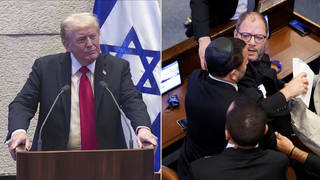
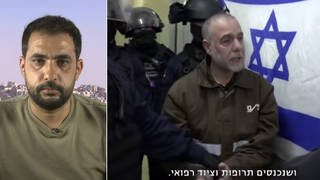
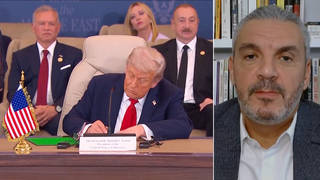
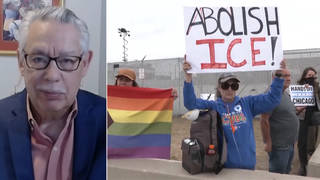





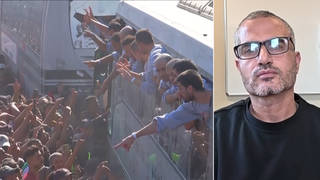
Media Options